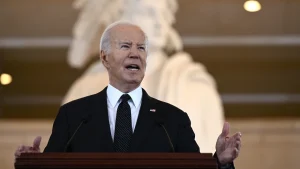On Tuesday, Georgia’s Republican Governor Brian Kemp signed into law new measures that could significantly impact the outcome of the 2024 presidential election in this crucial swing state. The legislation, passed by the Republican-controlled state legislature in late March, introduces changes to voter eligibility challenges and ballot access for independent candidates.
One notable provision eases the requirements for independent or third-party presidential candidates to qualify for Georgia’s ballot. Under the new law, any political party or body that has secured ballot access in at least 20 states or territories can now appear on the state’s presidential ballot. This change could benefit non-major party candidates in a state that was narrowly won by Joe Biden over Donald Trump in 2020.
The law also expands the definition of “probable cause” needed to sustain challenges to voter registrations, including evidence of a voter’s death, obtaining a homestead exemption in another jurisdiction, or registering to vote at a non-residential address. Critics argue that this could lead to unnecessary burdens on election officials and baseless attacks on voter qualifications.
Additionally, the new law requires homeless individuals to use the county registration office as their voting address, rather than their current place of shelter. Opponents claim this could make it more difficult for unhoused people to vote, as their assigned precincts may be far from their actual location on election day.
The ACLU of Georgia has announced plans to sue to block the new rules, with its executive director, Andrea Young, characterizing the law as a “step back for voters’ rights and voting access.” Similarly, Fair Fight, a voting rights group founded by Stacey Abrams, has labeled the law as “voter suppression,” with its CEO, Lauren Groh-Wargo, suggesting that the GOP’s focus is on finding ways to “shave off votes they don’t like to win & creating the conditions to overturn results they don’t like.”

